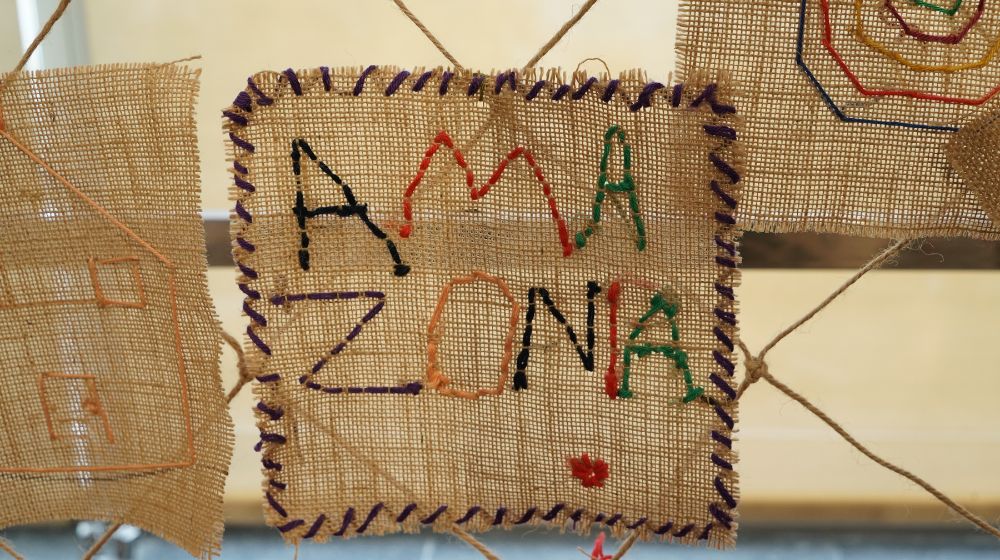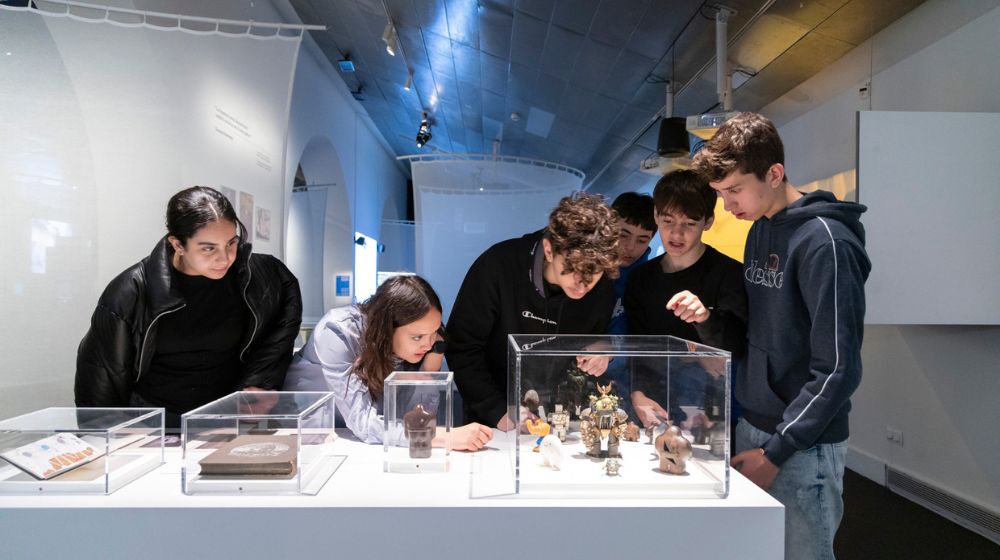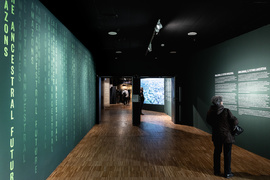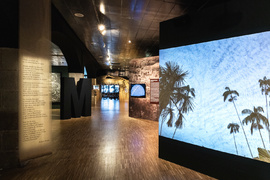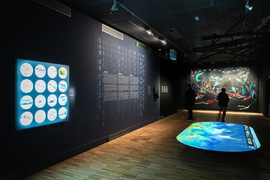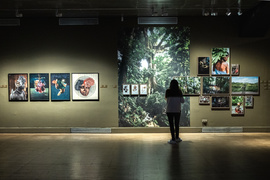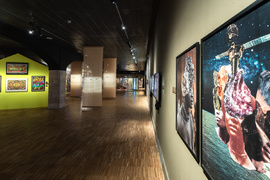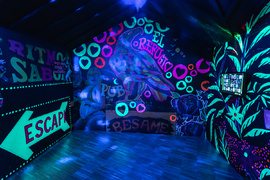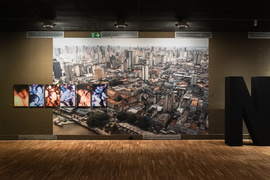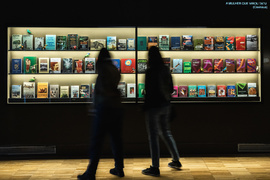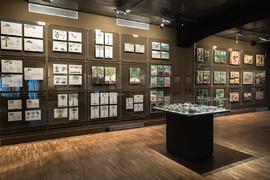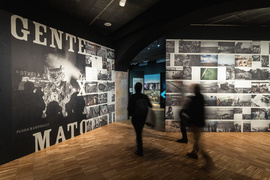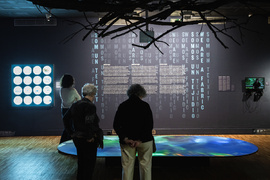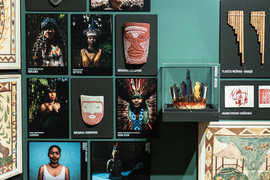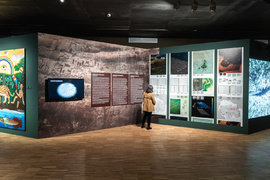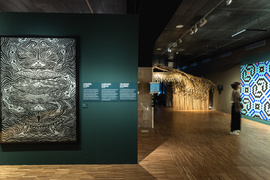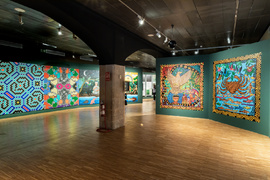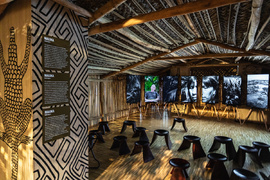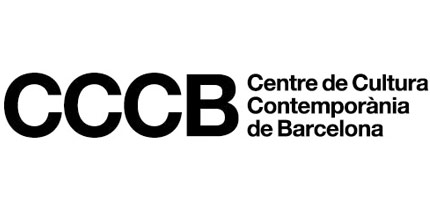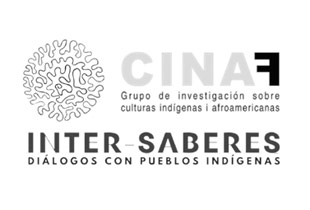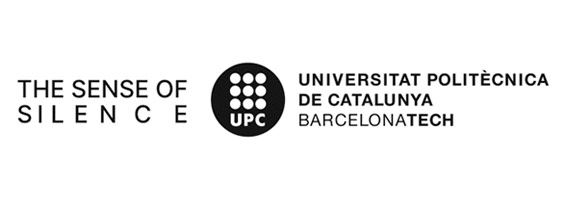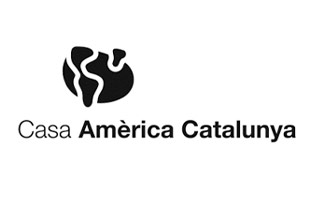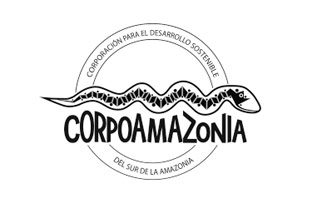Exhibition
Amazons
The Ancestral Future
Amazons. The Ancestral Future takes us into the immense natural and cultural richness of the territory, cities and indigenous communities of the Amazon to discover the art, the thinking and the huge ecological impact of a region that is central for the future of the planet.
The exhibition takes a collective look at Amazonian culture and highlights indigenous voices that through art, thinking, science and activism propose other ways of living, growing and relating to nature.
Amazonia is vast in its extension and diversity: it crosses nine states where over 30 million people live, 60% in urban areas. The region is also the original habitat of some 400 indigenous peoples who speak over 300 different languages. The temperature of the planet and climate change depend on the Amazon rainforest, the world’s largest tropical ecosystem.
Amazons. The Ancestral Future is a sensory journey through the immensity of rivers and forests, through the sounds, smells, cities, rituals, people and life stories of Amazonian communities. Today, this vast cultural and natural wealth is affected by deforestation, fires, drought and struggles for the control of raw materials, conflicts that the exhibition addresses with the help of the region’s leading scientists and researchers.
Far from offering a folkloric or fatalistic view of life in Amazonia, the exhibition defends the connection and the profound knowledge that its peoples have of nature and their ancestors. Amazonias. The Ancestral Future not only speaks of a valuable culture and ecosystem; it also makes us think about ourselves as a society, about the fragility of our environment, and about the urgent need to recover more respectful ways of living.
Curated by Claudi Carreras, the exhibition also has the collaboration of local experts such as Jõao Paulo Lima Barreto, Eliane Brum, Emilio Fiagama, Lilian Fraiji, Valério Gomes, Nelly Kuiru, Eduardo Góes Neves, Daiara Tukano and Joseph Zárate, and the participation of the Bioacoustics Applications Laboratory of the UPC, Ernesto Ventós Foundation and VIST Foundation.
List of participarting artists below.
Participating artists
The exhibition is a unique opportunity to enjoy new work that has been specially commissioned from outstanding artists and indigenous groups, like the impressive murals painted on site in Barcelona by the MAHKU collective, Rember Yahuarcani, Elías Mamallacta, and Olinda Silvano and Cordelia Sánchez, photographs and audiovisual montages by Andrés Cardona, and an artistic installation by Santiago Yahuarcani and Nereyda López. The exhibit also presents the works of Lalo de Almeida, Alberto César Aráujo, Ashuco, Christian Bendayán, Rafa Bqueer, Luiz Braga, Sérgio Carvalho, CEA, Chicha ads, Colectivo Água (Pablo Albarenga, Soll Sousa and Mariana Greif), Rosalba Cuelo, Paulo Desana, Estúdio Bijari, Alessandro Falco, Laíza Ferreira, Emilio Fiagama, Nicola Ókin Frioli, Diego Guerrero, Sheroanawe Hakihiiwe, Enrique Hernández, Yefferson Huamán, Karl Joseph, Emi Kondo, Alice Lepetit, Confucio Makuritofe Hernández, Pedro Martinelli, Leydy Martínez Panduro, Monky, Yanda Montahuano, Victor Moriyama, Musuk Nolte, Jorge Panchoaga, Gerardo Petsain, Berna Reale, Abel Rodríguez, Lili Sandoval Panduro, Leslie Searles, Alexandre Sequeira, Gena Steffens, Marc Alexandre Tareu, Tawna (Nixon Andy, Tatiana López, Enoc Merino Santi, Boloh Miranda, Sani Montahuano, Mukutsawa Montahuano and Lucía Villaruel), Turenko Beça, Iván Valencia, Wara Vargas, Márcio Vasconcelos, Versus Photo (Gihan Tubbeh, Musuk Nolte and Renzo Giraldo), Gê Viana, Fernando Vílchez, Marcela Yucuna, William Yukuna, Zecarrillo, artistans from the communities Bora, Kukama and Urarina (Perú), among others.
Related contents
Nahun Saldaña
Sound Landscapes that Have to Last
Using sounds that are recorded and recreated with voices, instruments and synthesizers, sound artist and researcher Nahun Saldaña invites us to reconnect with seven landscapes that we can still protect. This is an invitation to listen, feel and remember that we are still in time to preserve ...
Philippe Sands and Teresa Vicente
Rights for Nature
Philippe Sands and Teresa Vicente, eminent figures in the domain of environmental justice, describe their struggle to take legal action against ecocide, and to get ecosystems recognised as subjects with rights.


